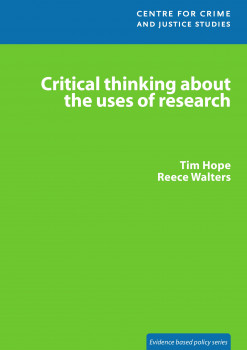Critical thinking about the uses of research
The government is reluctant to use the learning from critical, independent evidence based analysis and research to inform criminal justice policy making according to a new report published by the Centre for Crime and Justice Studies.

Tim Hope and Reece Walters argue that the government does not want learn from academics or entertain the kind of serious debate that independent academic research can generate
The author of one essay in Critical thinking about the uses of research , Professor Reece Walters, argues, 'Home Office suppression of criminological research that contradicts ministerial policy and opinion is a feature of this arm of government. The Home Office remains silent on all those topics that have the potential to reflect poorly on government and is not an institution that represents the British public'. Professor Walters calls for an academic boycott of any Home Office sponsored research.
In his essay, Professor Tim Hope, reflecting on his experience of working on Home Office research, argues that 'having placed such a premium on evidence based policy the government has failed to live up to that promise and has resorted to fixing both the process and publication of Home Office research publication to meet the political needs of the time.' Professor Hope is worried that officials and politicians can be tempted to be selective in their choice of the evidence used to illustrate success of programmes thus resulting in the exclusion of some data and the simplification or misrepresentation of others.
Will McMahon of the Centre for Crime and Justice Studies said:
The publication of Critical thinking about the uses of research raises important questions about the transparency of government funded crime research and the need for mechanisms to ensure that research funded by the tax payer is open to proper scrutiny.